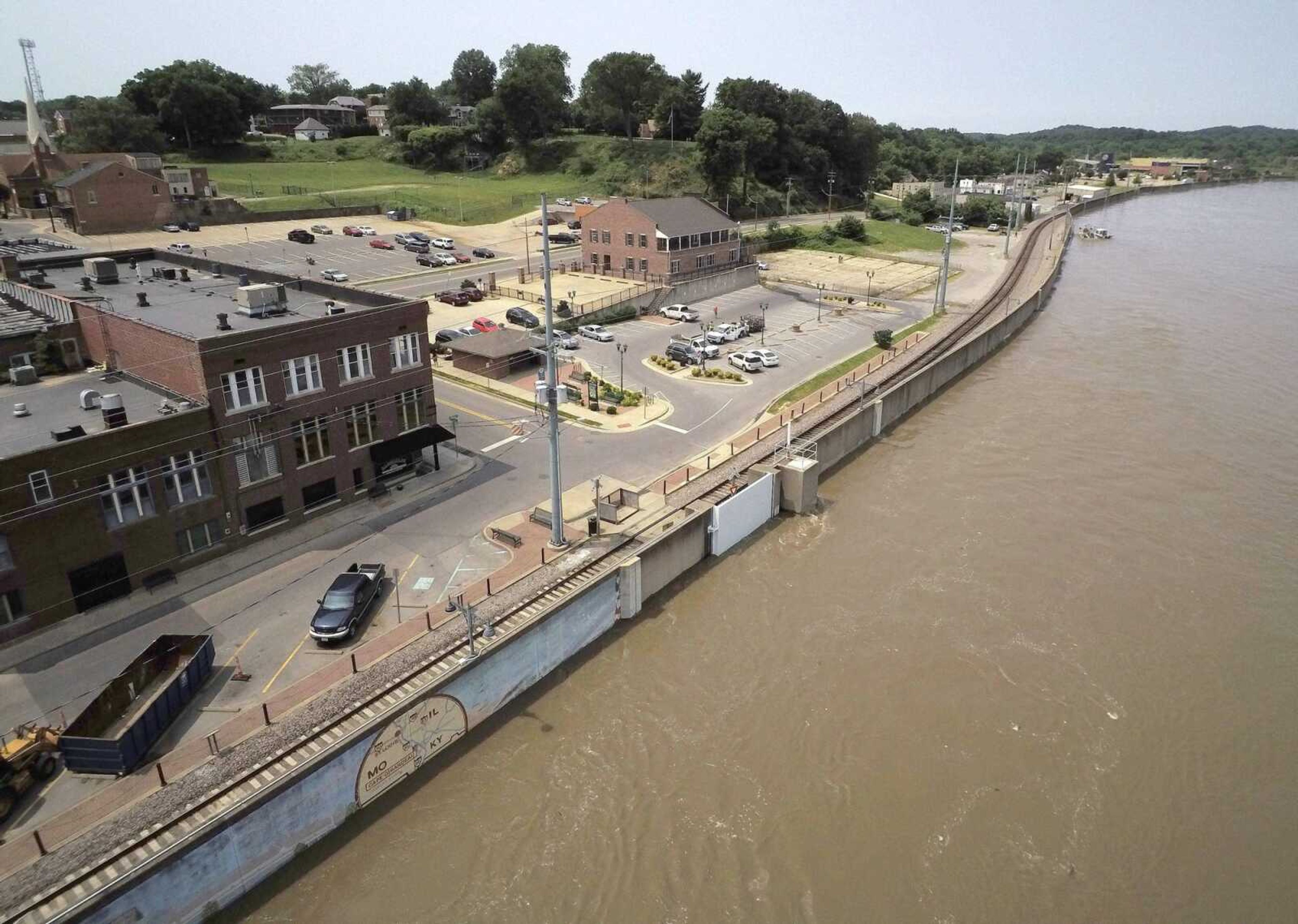A new water mark: Flood of 2019 likely to 'easily' set a record for duration
Barring an unlikely rapid fall in the next two weeks, it appears the Mississippi River will set a record later this month for consecutive days above flood stage at Cape Girardeau. The river exceeds flood stage anytime the gauge at Cape Girardeau is higher than 32 feet. The record for consecutive days above 32 feet at the local gauge is 125 set between June 10 and Oct. 12, 1993, according to the U.S. Army Corps of Engineers, which has tracked river levels along the Mississippi since the 1800s...
Barring an unlikely rapid fall in the next two weeks, it appears the Mississippi River will set a record later this month for consecutive days above flood stage at Cape Girardeau.
The river exceeds flood stage anytime the gauge at Cape Girardeau is higher than 32 feet. The record for consecutive days above 32 feet at the local gauge is 125 set between June 10 and Oct. 12, 1993, according to the U.S. Army Corps of Engineers, which has tracked river levels along the Mississippi since the 1800s.
As of today, the river at Cape Girardeau has exceeded flood stage for 112 straight days, a streak that began March 13. That is the second-longest streak on record for Cape Girardeau’s gauge, according to Russell Errett, a hydraulic engineer in the water management office at the Corps of Engineers office in St. Louis.
Based on river stage forecasts for the next two weeks, Errett said the 125-day record “will easily be broken” in two weeks when the river is expected to still be almost 3 feet above flood stage.
The Mississippi River stood at about 42.2 feet Monday afternoon, down more than 4 feet from its crest of 46.29 feet June 12, but still more than 10 feet above flood stage. The National Weather Service in Paducah, Kentucky, is calling for the river to fall below 42 feet by Wednesday and it should dip below 41 feet by Friday. By this time next week, it is predicted to be at around 37 feet, but the river gauge will still be at about 35 feet in two weeks, according to long-range forecasts.
So far this year, the Mississippi River has been above flood stage 124 days, including today. The record number of days above flood stage in a calendar year is 199 set in 1993.
“We probably won’t beat that this year unless we have another flood,” Errett said.
On the Illinois side of the river, in Alexander County, the Corps of Engineers and emergency personnel continue to battle seep water that has closed several roads and highways. The Illinois Department of Transportation was reportedly planning to close Route 146 to small vehicles between the Bill Emerson Memorial Bridge and East Cape Girardeau as of 7 p.m. Monday. SUVs and trucks will still be permitted to travel between Cape Girardeau and East Cape Girardeau for the time being.
Meanwhile, Illinois routes 3 and 146 between East Cape Girardeau and McClure have been closed since June 21 and Route 3 north of Gale, Illinois, since June 14. The Grapevine Trail between McClure and Tamms, Illinois, is also closed. Route 3 between McClure and the Union County line remained open Monday despite being submerged under several inches of water in some places.
“Although the river is falling very slowly at Cape Girardeau, we’re still over 42 feet right now, so there’s still going to be seepage under and through the levee, and the relief wells will still be flowing,” said John Osterhage, chief of the Corps of Engineers’ emergency management section in St. Louis. “The dry weather (over the weekend) definitely helped, but the floodwaters in Alexander County will still slowly increase over the next few days because the seepage continues to occur.”
As long as there is no significant rainfall in the coming days, Osterhage said the situation in Alexander County should improve in about a week.
“Once we get past (next) weekend, the river will start dropping quicker, which will provide some relief,” he said. As the river falls, there will be less seepage through and under the levee and the county should see a slowdown in the amount of water coming through relief wells, “but it will be some days then before we can start opening gravity drains to let the water flow out,” he said.
Connect with the Southeast Missourian Newsroom:
For corrections to this story or other insights for the editor, click here. To submit a letter to the editor, click here. To learn about the Southeast Missourian’s AI Policy, click here.











